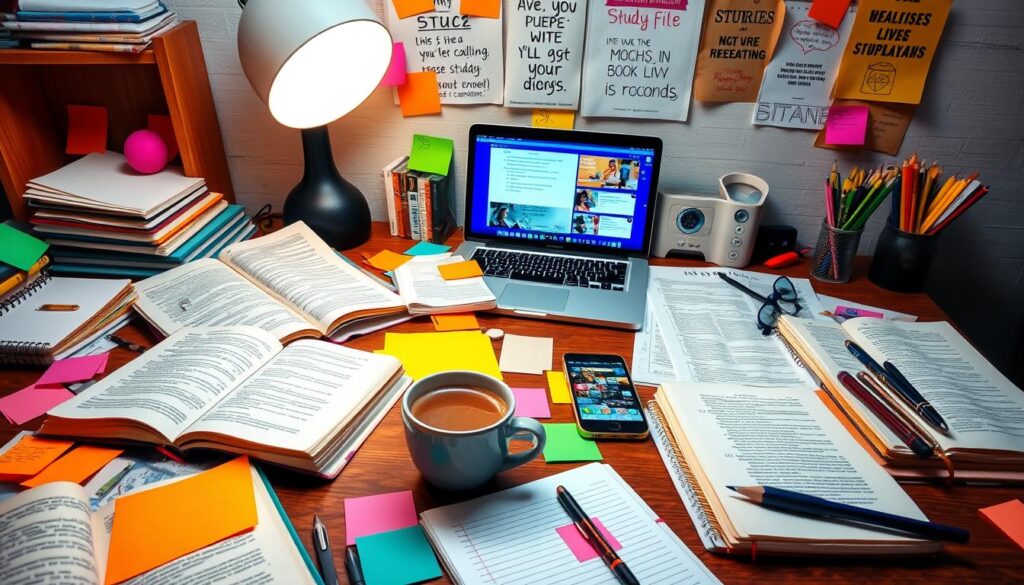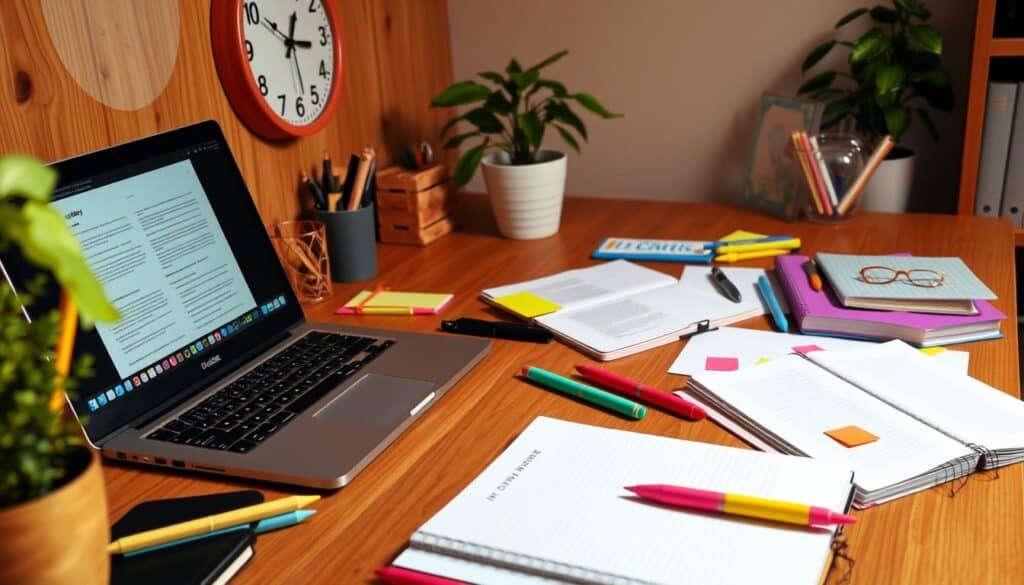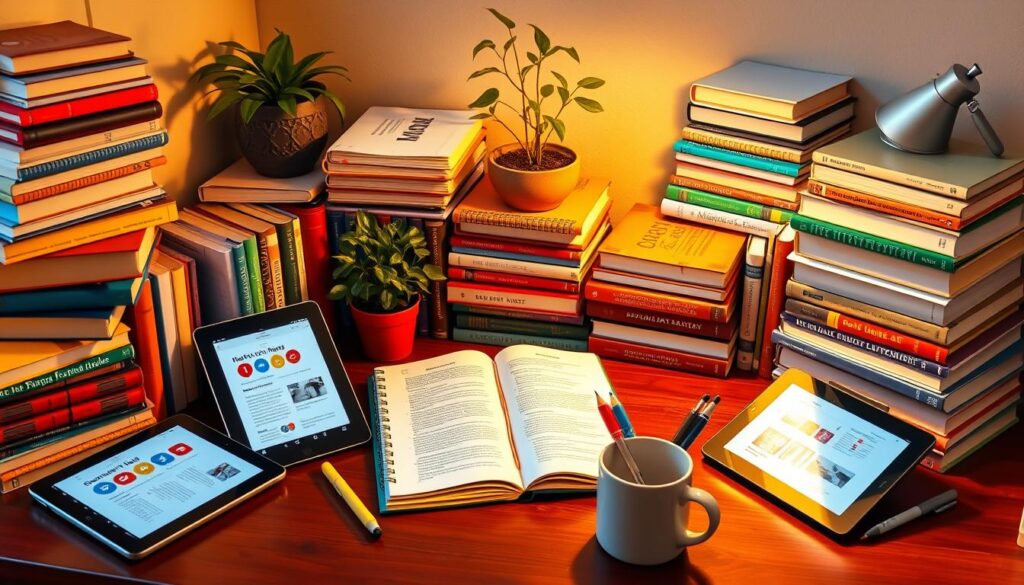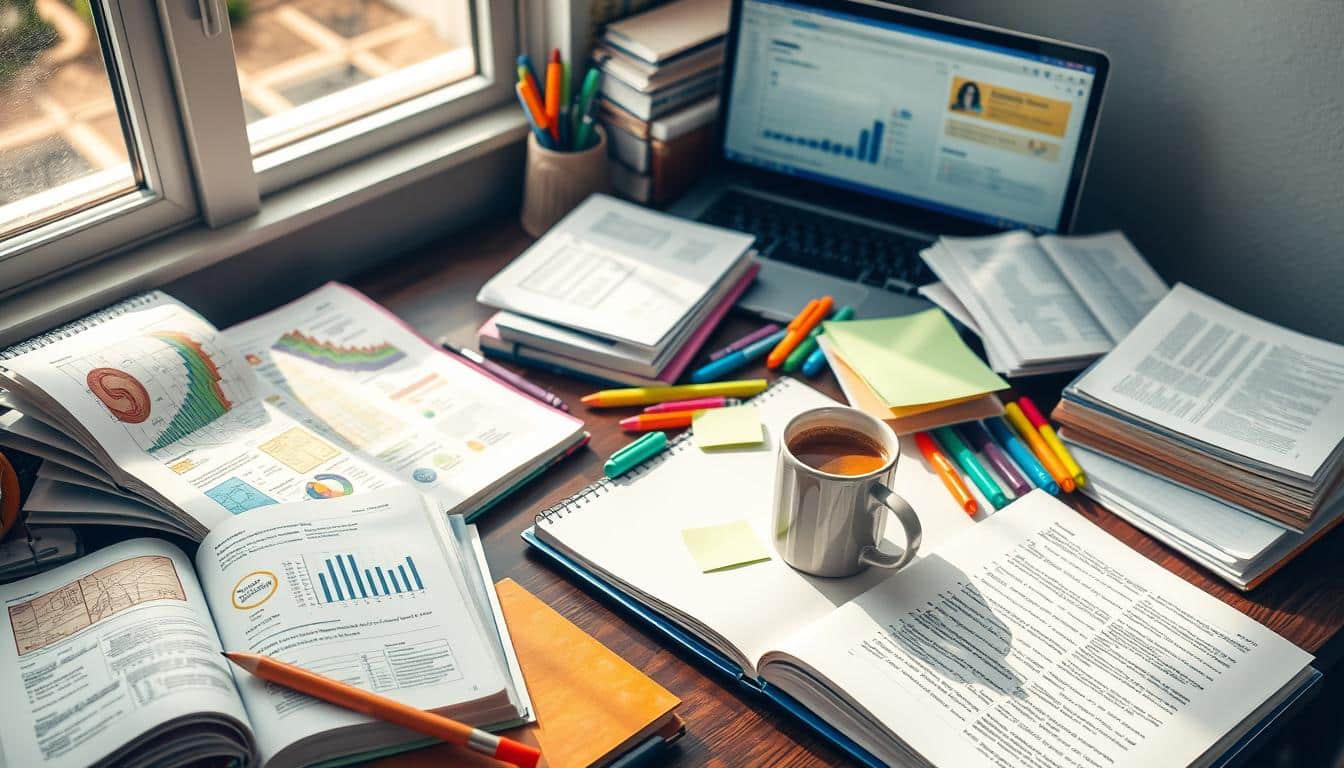Exams and major papers can be tough for college students. There’s so much to learn and remember. But, the right study techniques and resources can help a lot. It’s important to find what works best for you, whether you learn by seeing, hearing, or doing.
Using your class time well, studying with friends, making visual aids, and staying organized are good strategies. Also, having the right study materials is key. This includes textbooks, practice tests, and online resources.
Key Takeaways
- Identify your learning style to find the most effective study techniques
- Utilize a variety of study materials, including textbooks, practice tests, and online resources
- Maximize class time and create a organized study plan to stay on track
- Collaborate with peers through study groups to enhance understanding
- Develop visual aids like flashcards to aid memorization and comprehension
The Importance of Study Materials
Effective study materials are key for students. They help reduce stress and increase a student’s GPA. Knowing your learning style and using the right materials can boost your grades.
Reduce Stress and Increase GPA
Good study materials help students grasp course content and feel ready for exams. This confidence can lower stress and raise grades. Research shows students with quality study guides and practice tests often get better grades than those who only learn in class.
Different Learning Styles and Techniques
- Visual learners do well with diagrams, charts, and other visual aids.
- Auditory learners might like recorded lectures, discussions, or audio resources.
- Kinesthetic learners benefit from hands-on activities, simulations, and interactive materials.
Knowing your learning style and using the right materials can make learning better. This way, students can succeed in school.
“The right study materials can make all the difference in a student’s academic performance and overall well-being.”
Investing in quality study materials tailored to your needs is smart. It helps reduce stress and boosts grades. This approach lets students take charge of their learning, dive deep into subjects, and build skills for the future.
Types of Study Materials

Having the right study materials is key to success in school. Students can choose from many options like textbooks, course notes, and online resources. Knowing what works best for you can help a lot.
Textbooks and Course Notes
Textbooks and course notes are crucial. They give you the main ideas and details of a class. Textbooks have lots of examples and practice problems. Course notes summarize what was said in class.
These are great for those who like to read and write a lot.
Reference Books and Study Guides
Reference books and study guides also help a lot. Reference books go deeper into certain topics. Study guides make things shorter and include practice questions.
Practice Tests and Online Resources
Practice tests and online resources are also very helpful. They let you check your knowledge and find what you need to work on. Online resources like videos and papers offer different ways to learn.
By trying out different study materials, you can learn in a way that feels right to you. This can help you remember things better and understand your classes more deeply. It’s a great way to do well in school.
| Study Material | Description | Key Benefits |
|---|---|---|
| Textbooks and Course Notes | Provide core content and information covered in a class | Ideal for visual and auditory learners, offer in-depth explanations and examples |
| Reference Books and Study Guides | Offer additional explanations, examples, and practice problems | Helpful for students seeking more detailed information or concise summaries |
| Practice Tests and Online Resources | Allow students to apply knowledge and access supplementary materials | Beneficial for kinesthetic learners, provide alternative ways to engage with content |
Making the Most of Class Time
Getting the most out of class time is key to doing well in school. It’s important to attend every class, listen carefully during lectures, and take good notes. For those in digital classrooms, having the right technical requirements is also crucial.
If you don’t understand something during a lecture, ask the professor or teacher assistant for help. Being active in class and asking for help when needed can really help you learn better.
Students usually spend about 15 minutes reviewing their notes after each class session. This can really help you remember and understand what you learned. Some people find it best to read long texts in the morning when they’re most focused.
On average, students spend about 2 hours studying one subject. But how long you can focus can vary. Setting aside specific times for each subject can make studying more effective.
Studying with a classmate can also be helpful. It makes studying more fun and helps you stay on track. Plus, you can discuss and clarify things with someone who understands the material too.
| Study Time Allocation | Recommended Strategies |
|---|---|
| 15 minutes after each class | Review notes and key concepts |
| 2 hours per subject | Allocate specific blocks of time for each course |
| Study with a classmate | Enhance collaboration and accountability |
Study Techniques and Strategies

Learning effective study methods is key to doing well in school. Using proven techniques can make you learn better, remember more, and do well overall.
Study in Groups
Studying with friends can really help. You can share ideas, get things clearer, and see things from different angles. Group talks also help you stay on track, feel more responsible, and grow more confident.
Create Flashcards and Visual Aids
Flashcards and visual tools like diagrams and charts are great for remembering stuff. They use more than one sense, making it easier to remember and connect ideas.
Stay Organized and Manage Time
Good time management and staying organized are vital. Make a study plan, focus on what’s important, and avoid distractions. Being organized helps you stay focused, less stressed, and ensures you cover everything.
“Successful students are not just the ones who are naturally gifted, but those who have developed effective study habits and strategies.” – Dr. Jane Smith, Educational Psychologist
By using these study methods, you can reach your academic goals. Remember, being consistent and open to change are important for lasting success.
Study Materials

Creating a good study plan for exams means having the right study materials. You’ll need textbooks, notes, reference books, study guides, practice tests, and online resources. Using these materials helps you learn in a way that works best for you. It makes you understand the course better and boosts your chances of doing well.
Textbooks and Course Notes
Textbooks give a broad view of the course material. They cover important concepts, theories, and how to apply them. With detailed notes from lectures, you can really get to know the subject. This helps you see what you need to work on more.
Reference Books and Study Guides
Reference books and study guides offer deeper insights and new views on the course. They have quick summaries, practice questions, and tips for studying. These help you get through the material fast and prepare for tests.
Practice Tests and Online Resources
Practice tests and online resources are key for exam prep. Tests let you practice like the real thing, find your strong and weak spots, and get better at taking tests. Online tools like flashcards, tutoring, and quizzes make learning fun and interactive.
Using all these study materials helps you make a study plan that fits you. This way, you learn better, do well in school, and feel more confident and ready for exams.
| Study Material | Description | Key Features |
|---|---|---|
| Textbooks | Comprehensive coverage of course content |
|
| Course Notes | Detailed notes taken during lectures |
|
| Reference Books | Supplementary resources with deeper insights |
|
| Practice Tests | Simulated exam experiences |
|
| Online Resources | Interactive study tools and platforms |
|
“Effective study materials are essential for exam preparation and academic success. By exploring a variety of resources, students can tailor their learning experience and improve their understanding of the course content.”
Test Preparation and Review

Getting ready for exams is key to doing well. Going to review sessions with the teacher or TA helps a lot. They explain the test format and what topics to focus on while studying.
Attend Review Sessions
Review sessions with the teacher or TA are super helpful. They offer:
- Clear explanations of tricky topics
- Hints on the types of questions you’ll see
- Chances to ask questions and get feedback
- Help on the test’s format and structure
By going to these sessions, you’ll understand the material better. You’ll also feel more ready for the test preparation and test review.
Practice Test-Taking Strategies
It’s also crucial to practice test-taking strategies. This can include:
- Learning to manage your time well
- Getting used to different question types
- Staying calm and focused during the exam format and exam tips
- Practicing good habits like sleep and nutrition before the exam
By using these practice tests and test-taking strategies, you can boost your chances of doing well on the exam.
Also Read : The Importance Of Mock Exams In Exam Preparation
| Statistic | Value |
|---|---|
| Experience in the test preparation industry | Over 43 years |
| Books sold to students | Over 77 million |
| Students assisted in their test preparation | 408 million |
| Google rating | 4.6 out of 5 based on 488 reviews |
| Recognition for test-prep technology | EdTech Digest, Platinum Awards from Campus Technology and THE Journal |
Conclusion
In conclusion, using the right study materials and learning strategies is key to doing well in school. Knowing how you learn best helps you get the most out of class. You can use many study materials, like books, practice tests, and online tools.
Using smart study techniques can make studying easier. This includes working with others, making visual notes, and managing your time well. These steps can lower stress and help you get a better GPA. Also, preparing well for exams by reviewing and practicing can make you feel more confident.
The secret to success is not just the materials you use. It’s how you use them. Stay organized, keep reviewing, and stay open to new ideas. This way, you can reach your full potential and do well on exams and in school.
FAQs
Q: What are some effective study resources I can use for exam prep?
A: Effective study resources for exam prep include online study tools, downloadable materials, flash cards, and comprehensive study planners that help you organize your tasks and review vocabulary and grammar effectively.
Q: How can I design a study planner that improves my grade?
A: To design a study planner that improves your grade, start by setting clear goals, scheduling regular study sessions, including a variety of study resources, and incorporating time for exam review and practice exercises.
Q: Are there any free study tools available for high school learners?
A: Yes, there are many free study tools available for high school learners, such as online quizzes, downloadable flash cards, and vocabulary games that can help reinforce learning and improve memory retention.
Q: How can I apply communication theory to my study habits?
A: You can apply communication theory to your study habits by using effective communication strategies, such as discussing material with peers, teaching concepts to others, and using speech exercises to reinforce your understanding.
Q: What factors should I consider when selecting examination materials?
A: When selecting examination materials, consider factors such as the credibility of the source, the comprehensiveness of the content, the format (print or digital), and how well the materials align with your curriculum and learning objectives.
Q: How can I utilize cloud-based tools for my exam review?
A: You can utilize cloud-based tools for your exam review by accessing online resources that allow you to collaborate with classmates, share study materials, and keep your study planner updated from any device.
Q: What is the benefit of using flash cards for vocabulary exercises?
A: The benefit of using flash cards for vocabulary exercises is that they provide a visual and interactive way to reinforce memory, making it easier to recall definitions and apply the words in context during exams.
Q: How can I ensure that my study materials are up to date?
A: To ensure your study materials are up to date, regularly check for new editions, subscribe to updates from educational websites, and utilize online study resources that frequently refresh their content.
Q: What role does exercise play in effective study habits?
A: Exercise plays a crucial role in effective study habits by improving focus, reducing stress, and enhancing cognitive function, which can lead to better memory retention and overall academic performance.
Q: How can I prepare for a foreign language exam using digital tools?
A: You can prepare for a foreign language exam using digital tools by engaging with online language learning platforms, utilizing vocabulary apps, participating in interactive grammar games, and practicing with downloadable resources that focus on speech and communication skills.
